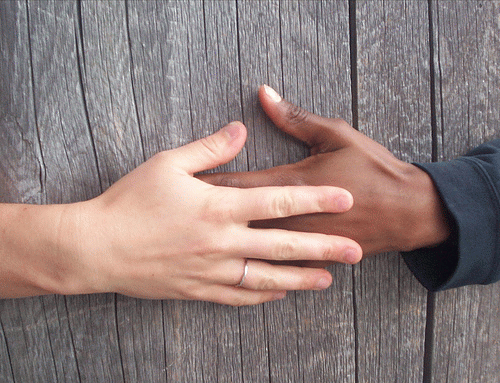Ever look up the word "race" in the dictionary? Oh, I know you know what it means, but play along for a minute.
This is from the freedictionary.com (because paying for definitions is just wrong!):
A local geographic or global human population distinguished as a more or less distinct group by genetically transmitted physical characteristics.
The primary "physical characteristic" is of course skin tone/color, but hair texture/color, musculature, blood type, and shape of facial features have also all been used -- not that you'd know that from the free dictionary.
On the off chance that dictionaries were one of those things where you get what you pay for, I consulted several other versions.
A division of mankind possessing traits that are transmissible by descent and sufficient to characterize it as a distinct human type. ~ Mirriam-Webster, 2005A category of humankind that shares certain distinctive physical traits. ~ Mirriam-Webster online, 2008A group, especially of people, with particular similar physical characteristics, who are considered as belonging to the same type, or the fact of belonging to such a group. ~ Cambridge Advanced Learner's Dict., 2008
The wording varies, but the definitions are remarkably alike. They are also remarkably inaccurate. Ironically, only the freedictionary even attempted to explain the science of race. In a footnote, the freedictionary stated:
The biological aspect of race is described today not in observable physical features but rather in such genetic characteristics as blood groups and metabolic processes, and the groupings indicated by these factors seldom coincide very neatly with those put forward by earlier physical anthropologists. Citing this and other points -- such as the fact that a person who is considered black in one society might be nonblack in another--many cultural anthropologists now consider race to be more a social or mental construct than an objective biological fact.
Well, that's not a bad start, as long as people read the footnote, but even the above is somewhat misleading, as it implies that there is a genetic basis for racial categories (albeit one that is not consistent with the classical Negroid, Mongoloid, Caucasoid categories that are still dominating the racial discourse). Yet, in fact, the genetic data suggest that there is no biological evidence for human subspecies (what we might call racial groups). To the contrary, all people are about 99.5% similar genetically, and the genetic variability that does exist (the remaining .5%) tends to be greater within ethnic groups than between them (see here for reference and more info).
This information is not trivial. A new study by Plaks, Malahy, Sedlins, and Shoda (see here) shows that people's mistaken beliefs about racial/ethnic groups being genetically different is related to their level of implicit prejudice.
According to the researchers:
Participants with low (vs. high) genetic overlap beliefs implicitly perceived the boundary between races to be more discrete. These results remained significant even when controlling for such variables as Need for Cognition, political ideology, essentialist beliefs, and "entity" beliefs. These findings suggest that believing that all people possess similar (vs. different) genetic makeup may serve as a key assumption that shapes racial categorization.
More importantly, Plaks and his colleagues said that the findings suggest that people's beliefs about genetic variation are malleable and could therefore be effectively targeted for anti-prejudice interventions. "We suggest that people with egalitarian ideals may still exhibit stereotyping at least partly because they harbor particular assumptions about genetic variation," wrote the researchers. Their study suggests that if those assumptions are challenged by more accurate information -- precisely the information provided in this particular article -- the implicit stereotypes are reduced.
This discovery (you can read more about it here) isn't going to eliminate racial prejudice and racism, but considering the growing need for people to work and coexist in a racially diverse context and the corresponding resources that are typically devoted to diversity, inclusivity, and cultural competence by both institutions of higher learning and employers, this findings are encouraging indeed. Apparently, even as we want to raise awareness about structural barriers to racial equity, we can also benefit from the knowledge that we all have much in common, including our humanity. Isn't it time we update our dictionaries?
___________________________________________
For mo re racial analysis of news and popular culture, join the | Between The Lines | Facebook page and follow Mikhail on Twitter.
(Note: You can view every article as one long page if you sign up as an Advocate Member, or higher).





